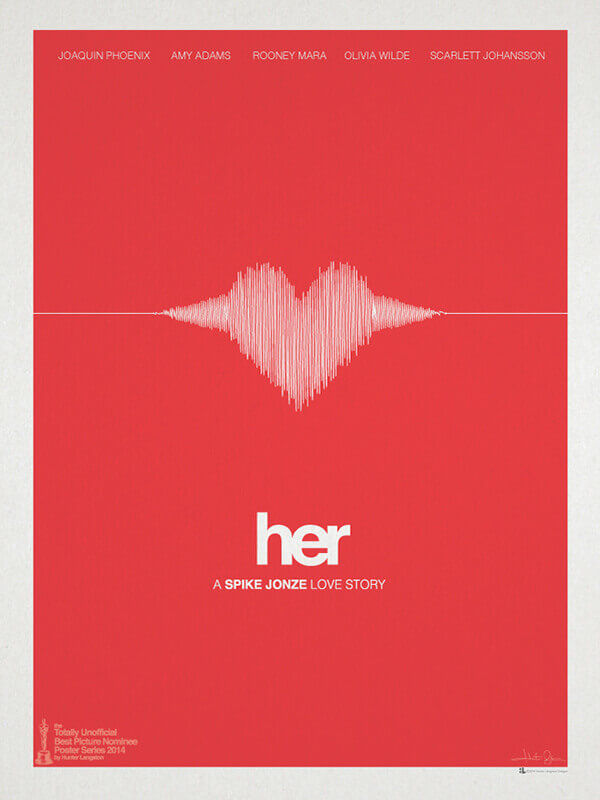Film Series “Artificial Intelligence in Cinema”: Do Computers Love Better?

The movie "Her" deals with love for the virtual personality of an operating system. Credits: "'Her' minimalist movie poster" by Hunter Langston is licensed under CC BY-NC 4.0
In love with the voice of an operating system: the movie “Her” skillfully presents this idea. An Oscar-winning script, an erotic voice and a loner as protagonist all contribute. Afterwards, Vera Demberg, Professor of Computer Science, and Alexander Koller, Professor of Computational Linguistics, both at Saarland University, comment on the film’s scientific content. It is the penultimate film in the film series “AI in cinema”. The Filmhaus in Saarbrücken is showing it in cooperation with the Competence Center for Computer Science and the German-American Institute on September 25 at 6:30 pm. Admission is free.
Los Angeles in 2025. Theodore Twombly, played by Joaquin Phoenix, earns his money by writing heartbreaking letters on behalf of others. His wife left him a few months ago. New acquaintances cannot fill the gap that he feels. A commercial draws Theodore’s attention to a new operating system based on artificial intelligence that communicates with the voice of a virtual personality. Theodore buys the operating system, installs it and selects a female voice. “Hello, I’m here,” she replies a few seconds later, giving herself the name Samantha (spoken by Scarlett Johansson). Theodore is thrilled. Because Samantha doesn’t just arrange his e-mails; she also proves to be a charming, understanding conversation partner. The service relationship quickly becomes a friendship that turns more and more into intimate familiarity. Finally Theodore falls in love with Samantha and the two become a couple. But this is where the new challenges begin.
Director Spike Jonze, famous for the film “Being John Malkovich”, shot “Her” in Los Angeles and Shanghai in 2013. During the 126 minutes of the film, he cleverly weaves the genres of satire, drama and science fiction together. This makes the film feel more like a technological utopia. Nevertheless, it’s surprising that the everyday life it depicts is both revolutionary and familiar. Has reality possibly overtaken fiction from Hollywood? Immediately after the film, two professors from Saarland University try to answer this question. Professor Vera Demberg researches the interface between computer science and computational linguistics; Professor Alexander Koller researches computer systems that, like Samantha in the film, understand human language and are able to express themselves in it. This is why he is also developing the computing methods on which such systems are based.
The film series “AI in cinema”, curated by the Filmhaus and the Competence Center for Computer Science, comprises a total of eight films, most of which were produced in the past decade. The films “Chappie” and “Ex Machina” from 2015 are among the others included. With the animated film “Wreck-it Ralph”, which is appropriate for ages six and up, the series also appeals to children, while the film “Robot and Frank” is aimed at older audiences. The only exception in terms of production year is “Blade Runner” directed by Ridley Scott. The classic, produced in 1982, is shown in the “Director’s Cut” version. The series ends on November 14 with the film “Transcendence”.
Further information:
http://www.filmhaus-saarbruecken.de
Questions can be directed to:
Gordon Bolduan
Science Communication
Competence Center for Computer Science
Saarland Informatics Campus E1.7
E-mail: bolduan@mmci.uni-saarland.de
Phone: +49 681 302 70741
Die Öffentlichkeitsarbeit am Saarland Informatics Campus wird unterstützt durch das Kompetenzzentrum Informatik Saarland, gefördert aus Mitteln des Europäischen Fonds für regionale Entwicklung (EFRE) und Mitteln der Staatskanzlei Saarland.



